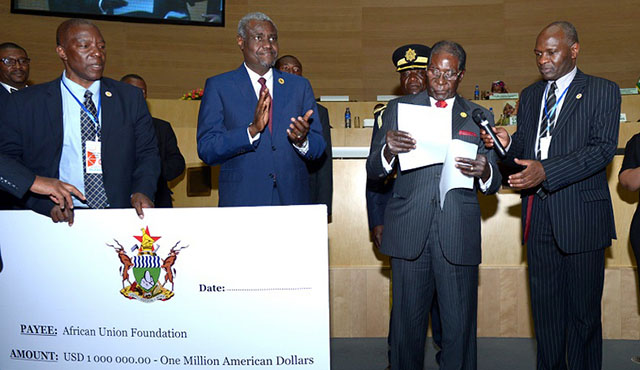What happened to ‘nhimbe’ concept?
Obert Chifamba Agri-Insight
Cue the sad and strong nostalgic tone running through this piece of writing! Yes, I yearn for a return to that spirit of communalism demonstrated in the ‘nhimbe/ilima’ (communal collaboration) concept, which used to prevail in our communities, especially the rural when it involved doing tasks that would naturally have proven insurmountable to individuals.
I remember, as I grew up villagers would invite those they were friends with to come and help do tasks such as tilling the land, ferrying manure to the fields, weeding, harvesting or thrashing and winnowing of large harvests or many other tasks without extending a monetary payment.
They would just brew some traditional beer and “maheu” (for non-alcoholics), buy a few loaves of bread or even bake their own from wheat flour and slaughter one or two road runners and in some cases slaughter a goat depending on the attendance.
This would be enough to see many people from the village or even beyond coming together to do the work in one day. A task that would have taken weeks for an individual to accomplish would be completed in one day; usually starting very early in the morning to somewhere around midday.
The rest of the day would be spent people drinking the traditional brew in the shed catching up on many social matters. It was on such occasions that sticking out social issues would also be discussed and solutions proffered. Nhimbes would provide a platform for people to iron out differences that would have otherwise seen them taking up arms against each other or even resorting to witchcraft.
The traditional concept of nhimbe runs deep in Zimbabwean culture, not just among the dominant Shona but the entire nation and was responsible to a very large extent for the food self-sufficiency that used to prevail throughout the country. No one would miss important seasonal deadlines owing to lack traction power, as is happening today. Even those that did not have cattle or donkeys would have their fields ploughed in time and people would even use Open Pollinated Varieties of seed if they could not afford treated seed from the shops. The burden would be less.
Nhimbes managed to erase the differences between the haves and have-nots and the concept was generally a social unifier, as it took care of both nutritional and social issues of the populace. Implements would be used communally and everything for the day of the function was for everybody and all people would have a sense of oneness that also promoted a very high sense of responsibility in most things people did.
Sadly, the concept just died a silent and natural death – its demise probably hastened by the advent of changes in agricultural technology, massive urbanisation and a shift in agricultural practices in recent years. Where people would congregate to plough using 10 spans of oxen, a farmer now uses a tractor or hires someone with his oxen for a fee.
Everything has just gone commercial and highly mechanised. This recent trend, though good and extremely productive, tends to nurse individualism and does not have room for that inclusivity that nhimbes used to foster.
Ideally, nhimbes allowed communities to come together and join hands to accomplish a task. Now all that is gone and people only see the dollar as the answer to their problems but this shuts the door on those that do not have cash.
They cannot always hire labour or implements yet under nhimbe they would do so without digging into their pockets for cash. This is really forcing the not-so privileged to either reduce the hectarage under cropping or even leave the land fallow, which in most cases is the ideal recipe for food insecurity.
Also, nhimbes offered a platformfor old foes to settle their grudges and forgive each other while doing something productive like tilling the land, digging anthill soil to fertilize fields or winnowing harvests for storage in the granaries, amid merry tales and drink. In the process disputes were discussed and solved, rumours verified, suspicions allayed and other forms of communal discord dealt with. All this was done in a funny, jocular and all-inclusive manner, such that at the end of the day, none went home burdened but refreshed.
In this regard, nhimbes were not just fora for ‘many hands coming together to make work lighter’, but also for peace making, conflict resolution, peace-building, early warning, and conflict prevention.
Nhimbes left the social fabric revitalised and working as one and allowed communities to use the social sphere they created to deal with underlying issues of conflict in their areas.
The nhimbe concept has been used in many countries globally as vehicles to promote the spirit of voluntarism and sustainable local development.
At independence Government sought to uphold the concept but at a slightly different level. Then, it was called “mushandirapamwe” (co-operative), which meant working together for the general good of production in most activities, of course with a huge slant towards agriculture.
This practice saw Zimbabwe leaving a very legible footprint in agricultural circles on the continent and even globally, as most of the food that earned it the status of bread basket of Africa came from smallholder farmers that thrived on “mishandirapamwe” while the large commercial farmers, predominantly white, concentrated on lucrative cash crops such as tobacco, flowers and sometimes cotton.
The natural death of mishandirapamwe also had telling consequences on production just like the nhimbes. Maybe it’s worth giving them a second chance and compliment Command Agriculture, just food for thought!
- Feedback: [email protected]









Comments